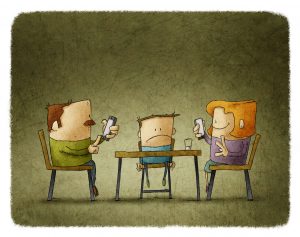Our mobile phone addiction, what it is costing us and how to deal with it
Technology can be our best friend, and technology can also be the biggest party pooper of our lives. It interrupts our own story, interrupts our ability to have a thought or a daydream, to imagine something wonderful, because we’re too busy bridging the walk from the cafeteria back to the office on the cell phone.
A CHECKLIST OF SYMPTOMS
Let’s do a quick and simple test. Take a look at the list of situations below and see if
you recognise any of them as something resembling personal experience:
-
A call or message comes in while you are driving. You immediately put on/switch on your ear piece to answer the call, or you start pressing on the screen to read the message.
-
You are at a family gathering, but instead of talking to your family and relatives, you are buried face-deep into your mobile phone: Reading about all the latest news and gossips, posting updates on FaceBook, viewing YouTube videos and/or Whatsapping your friends. Only occasionally do you put the phone down when you are being talked to or when eating.
-
Whenever your mobile phone is unable to receive a signal or the mobile network is down, you find yourself desperately trying to get a signal first and foremost, ignoring everything else that you were previously doing.
-
Before you slept, you were looking at your mobile phone. During your sleep, whenever you awaken or when you do finally wake up, the first thing you do is take a look at your mobile phone to see if there are any new messages/news/social media updates/etc.
-
You are playing games, watching videos, using social media, reading news. It was 9am when you started. Before you know it, the next time you looked at the clock, it is 12 noon and time for lunch.
-
Every once in a while, you find yourself reaching over to your mobile phone to see if you had any missed calls/messages/etc despite the phone not having rang or vibrated at all.
 If more than one of the situations above rings a bell and you have done them, you are, unfortunately, not alone. It may also indicate, unfortunately, that you may have something of a mobile phone addiction. Addiction is a harsh word that many people abhor. Yet in this digital age, how many of us can truly deny that the mobile phone is, singularly, the one piece of equipment that we are most attached to? How many of us could give up our mobile phones for a day (most of us could certainly not watch TV or use our computer for a day)? And if we cannot, does it not make the mobile phone a kind of “digital drug” that we have become addicted to?
If more than one of the situations above rings a bell and you have done them, you are, unfortunately, not alone. It may also indicate, unfortunately, that you may have something of a mobile phone addiction. Addiction is a harsh word that many people abhor. Yet in this digital age, how many of us can truly deny that the mobile phone is, singularly, the one piece of equipment that we are most attached to? How many of us could give up our mobile phones for a day (most of us could certainly not watch TV or use our computer for a day)? And if we cannot, does it not make the mobile phone a kind of “digital drug” that we have become addicted to?
THE PAST VS THE PRESENT
Remember a time when mobile phones were not used much beyond making/answering calls or sending short messages? For example, when we were teenagers going to watch a movie with our friends. We would maybe arrange to meet prior, have a meal together, stand around in a circle to have a chat and a laugh, before going into the cinema. This was before the age of smartphones. If someone used a phone, it was to call someone to pick him/her up, to tell parents he/she was safe and going back late or soon, or to text someone to see why they were late.
Our phones were not the centre of our worlds. They were things we had on us to serve a purpose, like a wallet or a watch. Some of us did not even have phones then, and had pagers instead. Our world was with each other. We focused on each other, meeting face-to-face and speaking to each other. Social interaction was closer and more intimate. Those days may never come back.
Take a look today when you go to a cinema and if you happen to chance upon a group of teenagers going to watch a movie together, observe them. Most of the time, they may not be talking directly to each other. In fact, they may not even be looking at each other. They are probably looking and smiling into the soft glow of an LCD screen (perhaps they are messaging another friend(s) IN the group).
Occasionally, they may glance up from their devices to make sure the group is still there. Sometimes, the phones would go back in their pockets for a short while. But, when that next notification vibrated or if ever they feel “bored”, the phones are back out again. It is as if the longer a notification is left unchecked, the more the anxiety and unease they felt.
PHYSICAL AILMENTS OF AN ADDICTION
Putting aside the impact of mobile phone addiction on our social behaviour, the possible physical effects of mobile phone addiction alone should cause alarm. Various studies have thrown out possible physical effects of excessive mobile phone use. A Delhi Psychiatry Journal titled Cell Phone Dependence — A New Diagnostic Entity suggested that prolonged mobile phone use can lead to what is known as digital eye strain. This is the pain and discomfort associated with viewing a digital screen for over 2 hours, where one’s eyes may begin to burn and itch, with blurred vision and eye fatigue. Digital Eye Strain can also cause headaches.
In addition, beyond digital eye strain, other studies have indicated other problems that may surface. They include neck problems which is also known as “text neck”. This refers to neck pain resulting from looking down at a mobile phone or tablet for too long. Furthermore, due to our prolonged and indiscriminate use of mobile phones regardless of location, including the toilet, there may also be increased risk of illnesses due to exposure to germs. A University of London study showed that 1 in 6 mobile phones may have fecal matter on it. E. coli bacteria which can cause fever, vomiting, and diarrhea, is found on many phones. A South University (Columbia, USA) experiment also found phones (out of a sample size of 60) were frequently found to have been contaminated with the MRSA bacteria. MRSA bacteria cause painful abscesses and can potentially cause life-threatening infections in bones, joints, surgical wounds, bloodstream, heart valves, and lungs.
As illustrated in the list of examples about using the mobile phone while driving, many people believe that they can multitask and use their phones while driving, However, this can cause significant impairment and puts the driver and others on the road in danger. Research by Transport Research Laboratory (TRL Limited) in the UK revealed that texting and driving can be just as dangerous as drinking and driving. Preliminary studies have also revealed that mobile phone radiation may decrease sperm count, sperm motility and viability, potentially leading to male infertility problems.
PSYCHOLOGICAL EFFECTS OF AN ADDICTION
Beyond the physical effects of excessive mobile phone use, there are also possible psychological repercussions to consider. One of these is sleep disturbances. An Ohio State University study linked mobile phone addiction to an increase in sleep disorders and fatigue in users. Mobile phone use just before bed increases the likelihood of insomnia. This is due to the blue light emitted from the mobile phone screen which may decrease sleep quality. Mobile phone use could also increase the amount of time it takes to fall asleep as the light emitted from the mobile phone may activate the brain. A 2017 longitudinal study of over 1000 Australian high school students aged 13 to 16 found that poor-quality sleep associated with late-night phone use was linked to a decline in mental health, such as depressed moods, declines in self-esteem, and coping ability. Relationship problems may also surface where with the large amounts of time spent online, offline relationships may suffer as a result of neglect in favor of mobile phone and social media use.
Instead of focusing on the people around them, people spend time talking to and pleasing people whom they rarely or have never met in person. Other possible problems include anxiety and depression. A study from the University of Illinois in 2016 found that high engagement with mobile technology is linked to anxiety and depression in college-age students, as they used devices to avoid dealing with unpleasant experiences or feelings. Research found that college students who use their mobile phones the most are more likely to feel anxious during downtime. Also, a University of Pittsburgh School of Medicine Social Media & Depression Survey conducted in 2016 found 2.7 times higher rates of depression were found in frequent social media users over less frequent users.
Instead of focusing on the people around them, people spend time talking to and pleasing people whom they rarely or have never met in person.
SELF-HELP TIPS TO REDUCE MOBILE PHONE USE
There are a number of steps you can take to get your mobile phone use under control. While you can initiate many of these measures yourself, an addiction is hard to beat on your own, especially when temptation is always within easy reach. It can be all too easy to slip back into old patterns of usage. Look for outside support, whether it’s from family, friends, or a professional therapist, if necessary. Here are some simple steps that you can take to reduce your mobile phone use/reliance:
-
Recognise the triggers that make you reach for your phone
Is it when you are feeling lonely or bored? Use the time for self-improvement instead. Try reading a book on subjects of interest or go for a jog or a swim. Or keep yourself occupied with social activities. Join a hobbyist club or join a sports team. You will discover there is plenty of other things that you can do besides gazing at your mobile phone. Or is your mobile phone use a distractive way of coping with depression, stress, or anxiety? Find healthier and more effective ways of managing your moods, such as practicing relaxation techniques.
-
Understand the difference between interacting in-person and online
Humans are social creatures. We’re not meant to be isolated or to rely on technology for human interaction. Socially interacting with another person face-to-face (eg: Making eye contact, responding to body language, etc) can make you feel calm, safe, and understood, and quickly put the brakes on stress. Interacting through text, email or messaging bypasses these non-verbal cues so they won’t have the same effect on your emotional well-being. Besides, online friends can’t hug you when a crisis hits, visit you when you’re sick, or celebrate a happy occasion with you.
-
Build your coping/interaction skills
Perhaps tweeting, texting or blogging is your way of coping with stress or expressing anger. Or maybe you have trouble relating to others and find it easier to communicate with people online, where an avatar or username’s cloak of anonymity provides you with a feeling of security? Building skills to cope with negative feelings and/or to interact with other people more effectively will help you weather the stresses and strains of daily life without relying on your mobile phone.
-
Strengthen your support network
Set aside dedicated time each week for friends and family. If you are shy, there are always ways to overcome social awkwardness and make lasting friends without relying on social media or the internet. Find people with similar interests, try reaching out to colleagues at work, join a sports team or book club, enrol in an education class, or volunteer for a good cause. You will be able to interact with others like yourself. Let relationships develop naturally, and form friendships that will enhance your life and strengthen your health.
For most people, getting control over their mobile phone and internet use is not a simple case of quitting cold turkey. Think of it more like going on a diet. Just as you still need to eat, you probably still need to use your phone for work, school, and research; or to stay in touch with friends. Your goal should be to cut back to more healthy levels of use.
First, try self-imposing a limit on your time using your mobile phone. For example, allow yourself to spend time on your phone only after you’ve completed a homework assignment or finished your tasks for the day. Try switching off or keeping your phone away from yourself at certain times of the day. These may include when you are driving, in a meeting, at the gym, having dinner, or playing with your kids. And certainly do not take your phone with you to the bathroom or to bed. The blue light emitted by the screens can disrupt your sleep if used within two hours of bedtime. Turn devices off and leave them overnight to charge. Instead of reading eBooks on your phone or tablet at night, pick up a book. You will not only sleep better but research shows you will also remember more of what you’ve read. If your job requires you to be on call 24/7, leave your phone in ringing mode, with a volume loud enough for you to hear despite being some distance away. If you are worried your ringing phone will wake the kids up, shut the room door.
As mentioned earlier, replace your mobile phone use with healthier activities. If you are bored and lonely, resist the urge to use your mobile phone. Find other ways to fill the time, such as meditating, reading a book, chatting with friends in person or playing with your pet. You might also want to try removing or deactivating social media apps in your phone so you can only check Facebook, Twitter and the likes from your computer. There is really no need for you to broadcast social media updates of your statuses constantly around the clock. And finally curb your fear of
missing out. Accept that by limiting your smartphone use, you are likely going to miss out on certain invitations, the latest breaking news, or new gossip of the hour.
Anyway, there are always so many things happening in the world and so much information available on the internet, it is almost impossible to stay on top of everything. It is ok to be late finding out about the latest developments. Accepting this can be liberating and help break your reliance on technology. While there may be some whose jobs require them to be on top of the latest news, use filters to limit the breaking news notifications sent to your phone so that you only receive the most relevant updates you need.
HELPING CHILDREN/TEENAGERS COPE WITH MOBILE PHONE ADDICTION

A 2018 Pew Research Report showed that 45% of teenagers said they use the internet “almost constantly,” and another 44% said they go online several times a day. According to this report, 50% of teenage girls are “near-constant” online users, compared to 39% of teenage boys. 95% of teens have access to a smartphone. And according to the results of another Common Sense Media Report in 2016, it was found that 50% of teenagers “feel addicted” to mobile devices, while 59% of parents surveyed believe that kids are addicted to their devices. This survey also showed that 72% of teenagers and 48% of parents feel the need to immediately respond to texts, social-networking messages, and other notifications; 69% of parents and 78% of teenagers check their devices at least hourly.
Given that teenagers do use their smartphones for a variety of reasons, both personal and academic (often simultaneously), it helps to focus less on counting the minutes of use and more on how they use their smartphones. Parents hear a lot about the importance of teaching balance, but part of evaluating for a healthy balance lies in understanding how teenagers actually use their phones and what purpose that use serves them. YouTube, for example, can be both recreational and academic. There are some steps that parents can take to help children/teenagers reduce their mobile phone use/reliance.
If necessary, use apps to monitor and limit your child’s smartphone use. There are a number of apps available that can limit your child’s data usage
Perhaps the most important thing to remember for parents is to lead by example and be a good role model. Children have a strong impulse to imitate, so it is important that parents lead by example and manage their own smartphone and internet use. It is no good asking your child to unplug at the dinner table while you are staring at your own phone or tablet and stating that you are different from them (because your job requires it). Likewise, in front of your children, ensure that most of your mobile phone/internet use is constructive. Read articles of interest pertaining to science or arts and share the knowledge with your kids. Let them realise the mobile phone is a good tool for finding and sharing knowledge. Do not spend a lot of your time playing games in front of them and certainly, do not let your own mobile phone use distract you from parent-child interactions. At home, create “phone-free” zones where mobile phone use is restricted. The use of smartphones or tablets may be confined to a common area of the house, where you can keep an eye on your children’s activity and limit time online. Ban phones from the dinner table and bedrooms and insist they are turned off after a certain time at night. At their age, they should not be on call 24/7.
If necessary, use apps to monitor and limit your child’s smartphone use. There are a number of apps available that can limit your child’s data usage or restrict texting and web browsing to certain times of the day. Other apps can eliminate messaging capabilities while in motion, so you can prevent your teen using a smartphone while on the move. Parents should also talk to their children about appropriate mobile phone use and educate them on the pros and cons, while at the same time, finding out about possible underlying issues of their children’s mobile phone reliance. Talk openly about the benefits and potential pitfalls of screen time. Lecturing rarely yields positive results, but asking your teenagers for input about the pros and cons can spark lively conversations. Educate them on how too much screen time may affect them physically, emotionally, academically, and socially. Further to this, compulsive mobile phone use can be a sign of deeper problems. Is your child having problems fitting in? Has there been a recent major change which is causing stress and causing him/her to be so absorbed in his/her mobile phone? Does your child have certain issues at school, at home or with friends that you are not aware of? Ask questions if you are not aware.
Finally, parents should encourage other interests and social activities for their children. By exposing them to other hobbies and activities, such as sports, arts, and other interests, you can get your child away from mobile screens. Spend time as a family unplugged. Take a look at our other article in this month’s issue on nature getaways for the family. In the extreme case of teenagers rebelling against their parents, and not wanting to listen to their words of advice, get help. If they hear the same information from a different authority figure, they may be more inclined to listen. Try a sports coach, doctor, or respected family friend. And do not be afraid to seek professional counseling, if you are concerned about your child’s mobile phone use and believe it to be absolutely necessary. There are various forms of treatments that can help, including cognitive behavioral therapy that can help your teen change maladaptive thoughts and behaviors into healthy and positive ones.
RECLAIMING OUR LIVES
Steven Spielberg was not wrong when he commented that technology can be our greatest enabler and the biggest party pooper all at once. In all aspects of life, there are always positives and negatives. With technology, it is so deeply ingrained into our daily lives and we are so engrossed by its convenience and new shiny applications thrown at us, we completely neglect how it is negatively impacting us. It is time we reclaim our lives outside of our online presence, and stop technology from interrupting our real life story.











